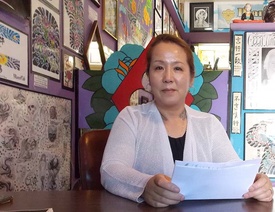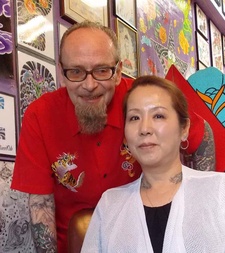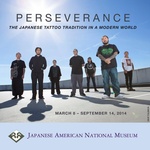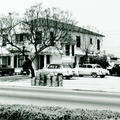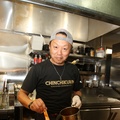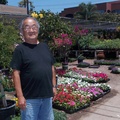I decided to write a letter to you so that in the process, I could better understand what you told me when I visited your tattoo parlor the other day. Your story gave me courage. It might have been because I myself, coincidentally, was feeling down at the time for some personal reason. But still, I’m sure that your story will give courage to others, just like it did to me—even just to one person. I just hope that it will.
First and foremost, I have to tell you that I had a lot of questions about tattooing before I met you and heard your story.
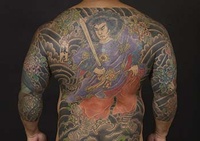
Tattoo by Junii. Photo by Kip Fulbeck, from Perseverance: Japanese Tattoo Tradition in a Modern World, presented by the Japanese American National Museum.
Why do people get tattoos? What makes them get tattoos? Do women have different motivations from men? The fact that I had these questions in mind might show just how ignorant I was about tattoos. However, it is true that I became drawn to you more and more, as I read your writing in the Perseverance catalogue (produced by the Japanese American National Museum for its tattoo exhibition) because you sounded like you had so much more to talk about—tattoos and all other things related.
It was precisely because I thought a phone interview from Los Angeles would not do you justice that I decided to visit you in San Francisco. I will ask about her feelings, buried so deeply in her heart, that have not yet been put into words. I want to hear them. My article would not be complete without them. I knew that I had to go to San Francisco.
“The Dragon Tattoo”
Your shop was located in downtown San Francisco. You were waiting for me when I entered your store at the appointed time, welcoming a visitor from far away.
At first, I was hesitant to call you Junko-san so casually. You have tattoos all over your body and give tattoos to others—a tattoo artist. To be honest, almost subconsciously I was thinking of you as difficult to approach, due to my bias against tattoos. I thought that maybe I should call you sensei (master).
But as soon as you started talking, I realized that my bias was wrong. This might sound a bit rude, but you really talked like a typical aunty figure that can be found in any neighborhood. And not only that, you were very approachable, as I saw that you printed out the questions I sent you beforehand and wrote answers to each question in detail. Then casually, you started to talk about your life, as if to talk to a friend you’ve known for a long time.
When you were little, you saw people with tattoos in a hot spring, but it was actually one movie that really called your attention to tattoos. You were ten years old. The title of the movie was The Dragon Tattoo starring Koji Tsuruta. But it wasn’t the tattoo itself that you got attracted to. It was the protagonist’s (played by Koji Tsuruta) way of life—a man with a strong sense of justice, loyalty, and compassion. I believe that it was exactly when you built an image of yakuza (Japanese gangster), a sense of justice and tattoos all combined. The image of tattoos that you would keep in mind for the rest of your life was created when you were just ten years old.
Teaching of Father
One of the most memorable parts about your childhood was the relationship between you and your father. He was strict in discipline, and he would hit you with chopsticks if you forgot your manners in any situation, from knowing how to use chopsticks to conversation at the table. Still, you were raised like a boy. You played catch with your father and went fishing together. You were probably papa’s girl.
There was one incident, soon after you entered high school, that seemed to have a great influence on your personality. I believe that it was the incident that taught you what kind of person your father really was.
One day, you were called up by a senior student, and you rebelled against it, saying “If you want something, you should come to ME.” Then you got into a small fight, and twisted and broke the arm of one girl. You thought that your father would kill you and that you would have to leave home. It was natural for you to have that fear, considering how strict he was to you in everyday life. After you got back home, there was a phone call from school, asking for your parents. They are not at home now—you lied to them when you answered the call. But at least you wanted to tell your father the truth. After some thinking, past midnight, you made up your mind and decided to talk to your father before you would leave the house. You went to his room and told him everything. What he told you at the time struck me, too. In fact, your father knew at the dinner table that something was wrong with you. He listened to your story from start to end. And this is what he said.
“You shouldn’t have hurt the girl. But I can understand why you got angry. Go to school and talk to your teacher. If they decide to punish you only, you can quit school.”
These days, it must be extremely hard to find a father like him who can say such a thing so flat out— the importance of having a sense of justice and the courage to take such action. I envied you for having a father like him.
There was even more to it. “For the entire half day, you must have suffered a lot,” he told you, for you made the confession after midnight. He said that you already got your punishment and thus did not scold you. Even though you told me that at the time you thought your father really understood you, I believe that it owed more to your relationship of deep trust—that he had trust in you. That relationship kept you thinking about your father’s words, teachings, and lessons and what he meant to tell you every time after the incident and even after his death.
A Lost Baby
You once got a small cross tattoo on your foot, and perhaps it was one typical act in your rebellious youth. During those days in Japan, there were a lot of restrictions on women in terms of what they could do on a daily basis, and no one would tell you about tattoos in which you had so much interest in. You said that you achieved a sense of accomplishment when you tattooed yourself, but it was probably a kind of temper developed during adolescence which is difficult to explain in words. After that, you thought about getting a real tattoo a few times, but you graduated from school, got a job, and married. The incident that followed gave you the reason to get real tattoos.
When you started talking about it in detail, you teared up and couldn’t bring yourself to say words for a while. While listening to your breathing which almost sounded like a sob, I kept silent and tried to feel your pain in your heart. I think that it was then when I realized deeply in my heart that tattoos have a truly important meaning to your life.
You said that your father was shocked to hear about your marriage with your first husband, but I won’t ask you why. After experiencing some miscarriages, you finally had your baby and dreamed of having him become either a yakuza or a tattoo artist—of course, a yakuza with a sense of justice. I could imagine a naïve young mother with pure hope. You must have been very happy.
However, seven days after the birth, the baby suddenly died due to Sudden Infant Death Syndrome. You must have felt like you were knocked down from heaven to hell. Moreover, it happened when your husband was away on business. And your baby was still warm. I could have helped my baby if I’d tried. Why didn’t I do anything? My baby might have been crying because he was asking for help…
A sense of anger was developed inside, along with grief, and you directed it to yourself. You felt so hopeless that you wanted to die, too. It felt so painful just to be alive. You didn’t want to do anything. I’m not sure how much I can understand your suffering at the time. It must have been a shock beyond imagination. You said that you couldn’t even go outside after you got discharged from the hospital, and it just explains how deep your pain was. And immediately after that, you got divorced.
Getting Real Tattoos
For six months, you lived your life in despair. One day, you heard that an acquaintance of yours was going to Kyushu, so you decided to go there with that person because you wanted to leave your hometown as soon as possible. And before leaving for Kyushu, you decided to get a real tattoo. Still suffering in despair for having lost a baby, you probably wanted to hold onto something by getting a tattoo on yourself. What was it that you wanted to hold onto?
I could easily guess what you wanted to have on your body—the Dragon that you encountered when you were ten years old. But it wasn’t the one you wanted. The tattoo artist showed you different design patterns, and you chose a picture of a son killing his mother. When I heard about it, I couldn’t help thinking, what a sad choice. The anger that you couldn’t direct to anyone and a deep sense of guilt that you thought you had to atone for. Still, you had to visit the tattoo artist a number of times to complete the tattoo. “I want to have it in its completion. I can wait until I have it, before I die,” you thought.
About two years later, you went back to Tokyo from Kyushu, but you lost contact with the tattoo artist that started the work on you. You looked for another artist who could complete the tattoo, but couldn’t find one. Then you met Master Horitoshi. I will let our readers read your story in the Perseverance catalogue for more details of your encounter with Master Horitoshi, his pupils, and how you got tattoos from him.
Pain in Heart and Body
Your encounter with Master Horitoshi and the time you spent to get tattoos from him became a turning point in your life. When I asked how you felt while getting tattooed, you had a hard time trying to find the right words. The way that you described it, adding words one by one, seemed to show the “truth” of what tattoos really meant to you.
“I was hurt so badly and there was this part of me that just wanted to die, but it’s not that easy. And there was another part of me that said I should not give in. Getting tattoos was indeed painful, but the pain in my heart and body turned into a form of encouragement.”
“Maybe the experience of getting tattooed is like being in a state of meditation. Listening to the sound of a needle poking my skin. It has rhythm. Especially when I’m getting a tattoo on my back, I hear a voice of encouragement. And I felt like I was finally able to understand my father’s words when he told me that true happiness can be achieved when our body, heart, and soul become together as one.”
Your father passed away at age 57, and you told me that you felt like you were re-learning his words. Don’t be discouraged. Always do your best. Don’t give up. There is no doubt that his words helped you rise from the deepest despair.
Again, in Perseverance you wrote in detail about how you met your current husband Bill Salmon, your marriage with him in 1988, your participation in a tattoo convention in America, and how you became a female tattoo artist, so I won’t repeat it here.
You also told me about honmon-butsuryushu. I believe that it has a deep meaning to you, as it grants you a sense of forgiveness, but I will pass it to the next time. Simply I will write here your words and how much they mean to you: “I wouldn’t be who I am without tattoo and religion.”
Peace in Heart
Lastly, I asked you how you want to live in America as a tattoo artist and also as a Japanese woman. “Whatever I do, I do my best and live my life to the fullest.” The simple words you told me were quite remarkable.
And you also told me about your dream. “I saw once in a dream that I was holding my knees and my heart was crying in a water puddle. For a long time I was pretending I didn’t see that part of myself. I would have to say sorry and hold myself. Now I think that I need to confront that part of me.”
I think I saw peace in your heart—the peace that you reached after having undergone such sorrow and deep despair. It’s a result of you having lived each and every day to the fullest, as you told me you wouldn’t be where you are if you missed any day.
For me, the time I was able to spend with you for this interview, though it wasn’t much, will forever remain in my heart as something very precious. Someday if I decide to get a tattoo myself, I will surely ask you.
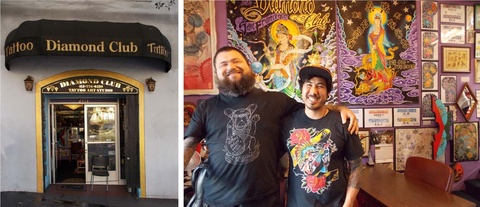
(Left) Junko Shimada and her husband Bill Salmon opened Diamond Club, a tattoo parlor, in 1999. In 2004, they opened their current shop in downtown San Francisco.
(Right) Matthew Douglas Verseput (on the left) and Kevin Pulido both work at Shimada’s tatoo parlor as tattoo artists.
Photo by Yukikazu Nagashima
* * * * *
Curated by Takahiro Kitamura, and photographed by Kip Fulbeck, Perseverance: Japanese Tattoo Tradition in a Modern World will be on view at the Japanese American National Museum from March 8, 2014 through September 14, 2014.
This exhibition features the work of seven internationally acclaimed tattoo artists, Horitaka, Horitomo, Chris Brand, Miyazo, Shige, Junko Shimada, and Yokohama Horiken, along with tattoo works by selected others. For more information, visit janm.org/perseverance.
All photos are courtesy of Takahiro Horitaka Kitamura.
© 2014 Yukikazu Nagashima


